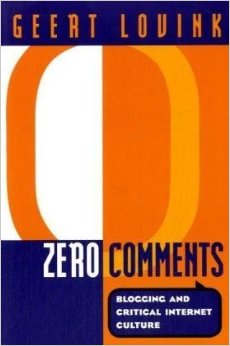Geert Lovink: Zero Comments: Kernels of Critical Internet Culture (2007)
Filed under book | Tags: · blogging, collaboration, distributed aesthetics, internet, internet culture, media theory, net criticism, networks, web 2.0

In Zero Comments Geert Lovink upgrades worn-out concepts and inquires the latest Web 2.0 hype around blogs, wikis and social network sites. In this third volume of his studies into critical Internet culture, Lovink develops a ‘general theory of blogging.’ Unlike most publications he is not focusing on the dynamics between bloggers and the mainstream news media. Instead of celebrating ‘citizen journalism’ blogs are analyzed in their ‘nihilist impulse’ to empty out established meaning structures. Blogs bring on decay of the 20th century broadcast media, and are proud of their in-crowd aspect in which linking, tagging and ranking have become the main drivers. The book also deals with the silent globalization of the Net in which no longer the West, but countries like India, China and Brazil are becoming main players in new media culture. It is not only the latest that Internet enthusiasts should focus on. Zero Comments upgrades concepts such as global Internet time, tactical media, the crisis of new media arts and the problematic relationship between architecture and the Net. The book ends with speculative notions on concepts such as organized networks, free cooperation and distributed aesthetics.
Publisher Routledge, 2007
ISBN 0415973155, 9780415973151
312 pages
Craig J. Saper: Networked Art (2001)
Filed under book | Tags: · art, bureaucracy, conceptual art, concrete poetry, fluxus, lettrism, mail art, network culture, networks, poetry, visual poetry

“Outlines an exciting new approach to this confluence of art, media, and poetry.
The experimental art and poetry of the last half of the twentieth century offers a glimpse of the emerging networked culture that electronic devices will make omnipresent. Craig J. Saper demarcates this new genre of networked art, which uses the trappings of bureaucratic systems—money, logos, corporate names, stamps—to create intimate situations among the participants.
In Saper’s analysis, the pleasures that these aesthetic situations afford include shared special knowledge or new language among small groups of participants. Functioning as artworks in themselves, these temporary institutional structures—etworks, publications, and collective works—give rise to a gift-exchange community as an alternative economy and social system. Saper explains how this genre developed from post-World War II conceptual art, including periodicals as artworks in themselves; lettrist, concrete, and process poetry; Bauhaus versus COBRA; Fluxus publications, kits, and machines; mail art and on-sendings. The encyclopedic scope of the book includes discussions of artists from J. Beuys to J. S. G. Boggs, and Bauhaus’s Max Bill to Anna Freud Banana. Networked Art is an essential guide to the digital artists and networks of the emerging future.”
Key words and phrases: Fluxus, concrete poetry, mail art, mail artists, visual poetry, Dick Higgins, Big Dada, conceptual art, Ray Johnson, George Maciunas, sound poetry, Ken Friedman, Guy Bleus, Bauhaus, detournement, neoist, Max Bill, Augusto de Campos, George Brecht, Joseph Beuys
Publisher University of Minnesota Press, 2001
ISBN 0816637075, 9780816637072
198 pages
PDF, PDF (updated on 2018-9-21)
Comments (3)Alexander R. Galloway, Eugene Thacker: The Exploit: A Theory of Networks (2007)
Filed under book | Tags: · internet, network culture, networks, ontology, philosophy, politics, theory

“The network has become the core organizational structure for postmodern politics, culture, and life, replacing the modern era’s hierarchical systems. From peer-to-peer file sharing and massive multiplayer online games to contagion vectors of digital or biological viruses and global affiliations of terrorist organizations, the network form has become so invasive that nearly every aspect of contemporary society can be located within it.
Borrowing their title from the hacker term for a program that takes advantage of a flaw in a network system, Alexander R. Galloway and Eugene Thacker challenge the widespread assumption that networks are inherently egalitarian. Instead, they contend that there exist new modes of control entirely native to networks, modes that are at once highly centralized and dispersed, corporate and subversive.
In this provocative book-length essay, Galloway and Thacker argue that a whole new topology must be invented to resist and reshape the network form, one that is as asymmetrical in relationship to networks as the network is in relation to hierarchy.”
Publisher University of Minnesota Press, 2007
ISBN 0816650446, 9780816650446
196 pages
Reviews: Daniel Gilfillan, Nathaniel Tkacz.
PDF (updated on 2012-7-8)
Comment (0)
